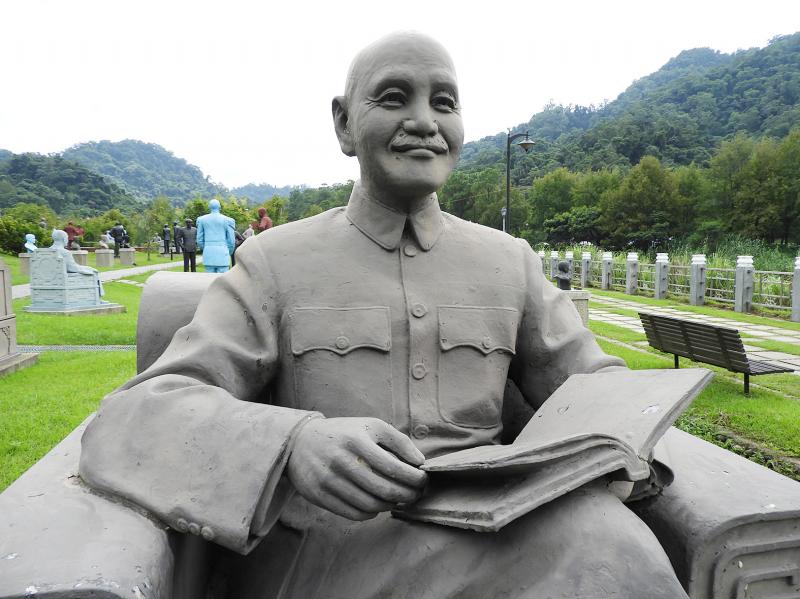Taiwan is still full of reminders of the authoritarian era under Chiang Kai-shek (蔣介石) and his son Chiang Ching-kuo (蔣經國), with a total of 1,814 sites, monuments and office spaces named in memory of them, an average of one for every 20km2 in the nation, a Transitional Justice Commission report released on Friday said.
Taiwan has 1,235 monuments, statues, sculptures and large-frame portraits commemorating the two Chiangs, commission Chairwoman Yang Tsui (楊翠) said, adding that of those, 511 fall under the central government’s jurisdiction, and only 54 have been removed or renamed.
There are also 579 memorial sites and office spaces named in remembrance of them.

Photo: Chen Yu-fu, Taipei Times
Excluding the 227 statues of Chiang Kai-shek and two of Chiang Ching-kuo at the Cihu Memorial Sculpture Park in Taoyuan’s Dasi District (大溪), there are 848 statues of Chiang Kai-shek in Taiwan, of which 511 belong to local governments and 337 belong to the central government, the report said.
Taipei has the most statues of Chiang Kai-shek at 129, followed by Taoyuan at 112 and Taichung at 98, it added.
For those under the central government’s jurisdiction, most of the statues dedicated to the two Chiangs are located in agencies under the Ministry of National Defense, the Veterans Affairs Council and the Ministry of Education, the report found, adding that they have 276 in total, or 82 percent.
The three ministries also have the highest number of office spaces and sites dedicated to the two Chiangs at 143, or 89 percent.
Of the 419 statues, office spaces and sites, only five have been removed or repurposed, and that was mainly done by universities, commission Deputy Chair Yeh Hung-ling (葉虹靈) said, adding that as the military and other schools have differing views on the removal of statues or monuments of the two Chiangs, discussions with the three ministries are ongoing.
“There are many ways to handle these reminders of Taiwan’s authoritarian past, including removing them, repurposing them into open public sites or spaces for the arts ... while moving them to be stored at a warehouse is also another option, or transferring them to cultural parks,” said Yang, adding the commission would continue to keep track of how the government agencies are dealing with the matter.

A Ministry of Foreign Affairs official yesterday said that a delegation that visited China for an APEC meeting did not receive any kind of treatment that downgraded Taiwan’s sovereignty. Department of International Organizations Director-General Jonathan Sun (孫儉元) said that he and a group of ministry officials visited Shenzhen, China, to attend the APEC Informal Senior Officials’ Meeting last month. The trip went “smoothly and safely” for all Taiwanese delegates, as the Chinese side arranged the trip in accordance with long-standing practices, Sun said at the ministry’s weekly briefing. The Taiwanese group did not encounter any political suppression, he said. Sun made the remarks when

The Taiwanese passport ranked 33rd in a global listing of passports by convenience this month, rising three places from last month’s ranking, but matching its position in January last year. The Henley Passport Index, an international ranking of passports by the number of designations its holder can travel to without a visa, showed that the Taiwan passport enables holders to travel to 139 countries and territories without a visa. Singapore’s passport was ranked the most powerful with visa-free access to 192 destinations out of 227, according to the index published on Tuesday by UK-based migration investment consultancy firm Henley and Partners. Japan’s and

BROAD AGREEMENT: The two are nearing a trade deal to reduce Taiwan’s tariff to 15% and a commitment for TSMC to build five more fabs, a ‘New York Times’ report said Taiwan and the US have reached a broad consensus on a trade deal, the Executive Yuan’s Office of Trade Negotiations said yesterday, after a report said that Washington is set to reduce Taiwan’s tariff rate to 15 percent. The New York Times on Monday reported that the two nations are nearing a trade deal to reduce Taiwan’s tariff rate to 15 percent and commit Taiwan Semiconductor Manufacturing Co (TSMC, 台積電) to building at least five more facilities in the US. “The agreement, which has been under negotiation for months, is being legally scrubbed and could be announced this month,” the paper said,

MIXED SOURCING: While Taiwan is expanding domestic production, it also sources munitions overseas, as some, like M855 rounds, are cheaper than locally made ones Taiwan and the US plan to jointly produce 155mm artillery shells, as the munition is in high demand due to the Ukraine-Russia war and should be useful in Taiwan’s self-defense, Armaments Bureau Director-General Lieutenant General Lin Wen-hsiang (林文祥) told lawmakers in Taipei yesterday. Lin was responding to questions about Taiwan’s partnership with allies in producing munitions at a meeting of the legislature’s Foreign Affairs and National Defense Committee. Given the intense demand for 155mm artillery shells in Ukraine’s defense against the Russian invasion, and in light of Taiwan’s own defensive needs, Taipei and Washington plan to jointly produce 155mm shells, said Lin,